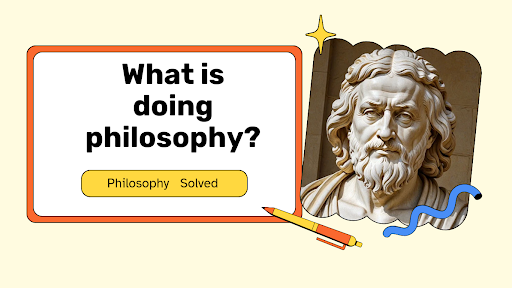Doing philosophy entails engaging in this active process with fundamental questions about existence, knowledge, morality, reality, and human life. Unlike the majority of disciplines that assure one of getting answers or perhaps empirical data, philosophy is primarily concerned with the process of asking deep, abstract questions and critically examining ideas. When we say "doing philosophy," we refer to the intellectual practice of engaging with these questions through reasoning, argumentation, and reflection. It is not just about reading the works of philosophers or memorizing concepts; it is about engaging oneself in an active reflective, analytical, and critical mode of thought that aspires to achieve understanding and clarity.
1. **Asking Fundamental Questions
At its core, doing philosophy means asking questions that deal with the most fundamental aspects of life and reality. These questions are often open-ended and do not have easy or straightforward answers. For example, philosophers ask:
- **What is the nature of reality?** Is the physical world all there is, or is there something beyond what we can perceive?
- **What does it mean to be human?** What is the essence of human nature? How do we define personal identity, and how does it persist over time?
- **How do we know what we know?** Can we trust our senses? What is the difference between belief, knowledge, and truth?
- **What is the meaning of life?** Is there a purpose to human existence? If so, how should we live in accordance with that purpose?
- **What is justice?** How do we create a just society? What are the rights of individuals, and how should they be balanced against the needs of the community?
These are examples of the kind of questions philosophers deal with. Doing philosophy involves developing the mental toughness to ask such questions and live with the complexities and doubts accompanying them.
2. **Critical Thinking and Analysis
One of the major concerns in doing philosophy is critical thinking-examining ideas carefully and logically. In philosophy, philosophers analyze arguments, identify assumptions, and assess the strengths and weaknesses of various claims. Critical thinking is the activity of breaking down complex issues into manageable parts, considering options and alternative perspectives, and coming to well-reasoned conclusions. This process will enable individuals to check an argument for its validity and expose any inconsistencies, contradictions, or flaws in reasoning.
For example, a philosopher pondering the question, "What is the ideal form of government?" would not accept certain views on democracy or authoritarian systems without first raising questions about the supportive assumptions for these systems, weighing arguments for or against them, and/or considering alternative systems. *Dialectical reasoning * is critical engagement with thought; it is at the heart of this thing called doing philosophy.
Moreover, doing philosophy requires a commitment to intellectual honesty and openness. Philosophers do not just argue for the sake of winning debates; they engage in discussions with the goal of arriving at truth or a deeper understanding, even if that means revising their own beliefs or conclusions.
3. **Clarification of Concepts**
Philosophers are often occupied with what is called *conceptual analysis*, a clarifying and investigation of terms and ideas central to our thinking. This is necessary, in large part, since many philosophical debates result from the misunderstandings or ambiguities in the uses of language. Freedom may refer to a lack of constraints, but what about internal constraints? Is it a social or political right? Clarifying these concepts is a crucial part of doing philosophy.
A philosopher might ask, for instance: *What does "justice" mean in the context of social policy?* In order to answer this question, they would not only look at what justice "is," but also investigate how people use the term in different situations, the implications of different interpretations, and whether those interpretations hold up under scrutiny. This process helps to ensure that the terms we use are clear, consistent, and logically coherent, which is critical to meaningful philosophical discourse.
4. **Engaging with Diverse Perspectives**
Doing philosophy also involves working with a wide range of ideas, traditions, and thinkers. Few philosophical questions have a single answer, and part of the process is learning from and critically thinking through diverse perspectives. The philosophers read not only ancient works but also the works of contemporary thinkers, exploring different schools of thought, including those of other cultures and traditions.
Or a philosopher might be interested in Western philosophy, studying Plato, Aristotle, Kant, or Descartes, but might want also to investigate Eastern philosophies like Confucianism, Buddhism, or Taoism. This would open new modes of thought regarding familiar problems and extend the range of intellectual resources that could be applied to philosophical questions.
This engagement with diversity allows philosophers to see beyond the limits of their own cultural or intellectual background, challenging assumptions and stimulating new lines of inquiry. It encourages a global, open-minded approach to solving problems, which is essential for fostering understanding in an increasingly interconnected world.
5. **Argumentation and Justification**
The major part of doing philosophy consists in constructing arguments. In the philosophical sense, an argument is a series of statements that are logically connected in support of some conclusion. Philosophy involves constructing arguments that are sound based on evidence, reasoning, and logical principles. It's not just a matter of persuading others, but a matter of demonstrating that your view is well-reasoned, coherent, and based on sound principles.
For example, when discussing the nature of morality, the philosopher might argue that moral precepts are based in human reason-as in Kantian ethics-or they might argue that moral truths depend upon cultural practices-as in cultural relativism. The task for the philosopher is to lay out a clear, logical explanation of why one view is preferable to the other, while at the same time considering potential counterarguments.
Argumentation also involves acknowledging and responding to potential weaknesses in one's position. It is not sufficient to assert a claim; the philosopher must be capable of defending that claim against objection. In this sense, philosophy is a dialectical process whereby ideas are continually sharpened and perfected through argumentation and reflection.
6. **Contemplation and Reflection**
While philosophy involves rigorous intellectual activity, it also requires deep personal reflection. Many philosophical questions-especially those in ethics or existentialism-are not just abstract exercises but are intimately tied to personal experience. Doing philosophy often means reflecting on one's own life, values, and assumptions in light of the insights that philosophical inquiry provides.
For instance, existentialist philosophers like Jean-Paul Sartre or Albert Camus reflect on the meaning of life within a world that might appear to have no inherent purpose. Doing philosophy in this regard involves reflecting on one's place in the world, the choices one makes, and the responsibility one has for creating meaning in life.
Most philosophical reflection brings a person to a larger degree of self-understanding, a better grasp of his or her values, and a more reflective, deliberate conduct of life. It invites individuals to consider the profound questions about human existence in a manner not abstracted from life nor merely theoretical, but grounded in personal experience and commitment.
7. **Philosophical Inquiry as a Way of Life
Finally, doing philosophy is much more than an academic affair; it can be a life commitment. Philosophical inquiry outlines how one approaches problems, comes to decisions, and relates to the world. It instills humility in the light of complex questions, a readiness for a variety of ideas, and dedication to learning as a never-ended process.
In many ways, doing philosophy is an ongoing, dynamic process; individuals have to remain intellectually curious, open-minded, and deeply involved with life's fundamental questions. Doing philosophy-both academically and colloquially-means setting for oneself an ongoing process or process of challenging one's abilities to think more clearly, act more justly, and live more meaningfully.
Conclusion
In a nutshell, to do philosophy is an active and dynamic intellectual undertaking that goes beyond the mere absorption of knowledge. It means asking basic questions, analyzing arguments critically, clarifying concepts, engaging with diverse ideas, constructing sound arguments, and reflecting deeply on one's life and values. Philosophy is not a search for fixed answers but a process of reflection, inquiry, and dialogue that helps individuals and societies think more clearly, critically, and wisely about the world. In doing philosophy, we do not just understand the world better but also enrich our own lives through reflective engagement with profound questions defining human existence.






0 Comments